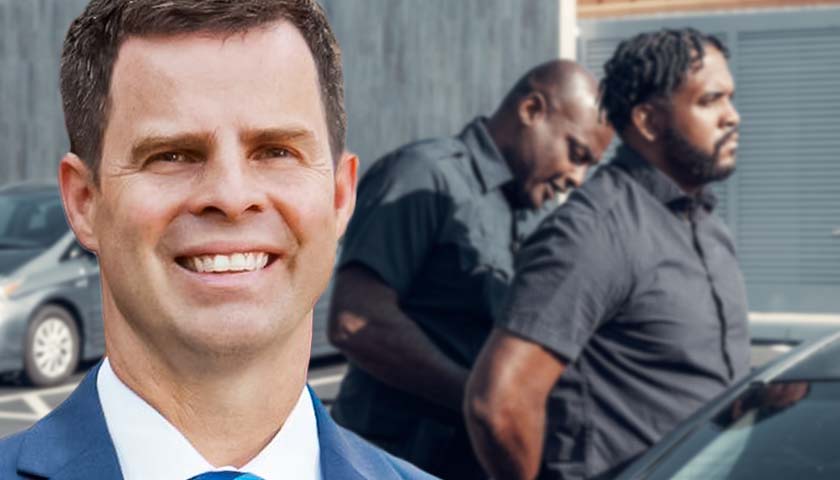Delegate John McGuire (R-Henrico) has introduced several bills that would repeal Democratic criminal justice reforms. McGuire’s proposals include bills to lower thresholds for felony larceny, make it easier to execute search warrants, and end local governmental authority to establish law enforcement civilian oversight bodies. Chief on the list is HB 59, which requires school principals to report misdemeanors to law enforcement and to the victim’s parents.
HB 59 aims at changes from 2020 bills HB 257 and SB 729, from Delegate Mike Mullin (D-Newport News) and Senator Jennifer McClellan (D-Richmond.) Their bills changed Virginia law so that principals were only required to report felonies. In January 2020, Mullins said in committee that the bill was meant to keep students from facing overly harsh criminal justice consequences.
“If two kids get into a fight over a girl, that you don’t have to call the police unless you think you should, in which case, you always can. There’s never a prevention saying you cannot call law enforcement to be able to intervene,” Mullins said.
The bill passed with Republican support.
The changes became a target for Republicans in 2021 amid confusion over Loudoun County Public Schools’ handling of sexual assaults that occurred on school property.
“As a father of five, I find it disturbing and downright evil that anyone would support a law that allows school administrators to refrain from notifying police when crimes such as sexual battery or stalking have occurred,” McGuire said in a November press release. “Parents have enough to worry about when their children are at school, they should be able to have the peace of mind that when a crime occurs against any child, schools will immediately report that crime to law enforcement. That’s why I’ll be introducing legislation in the upcoming session to repeal this law and ensure school administrators are once again required to report these crimes to law enforcement moving forward.”
McGuire’s HB 107 is another tough-on-crime reform that changes the threshold to trigger a felony charge for larceny from $1,000 to $500, which reverses McClellan’s 2020 SB 788.
“Too many Virginians – disproportionately from communities of color – spend prison time over what would be a misdemeanor in other states. Changing the felony larceny threshold is a common-sense step towards necessary criminal justice reform,” McClellan said in a 2020 press release.
The $500 level was itself an increase from $200, a level set in 1980. It was finally raised in 2018 as a compromise between the Republican-controlled General Assembly and Governor Ralph Northam, according to The Associated Press.
McGuire’s HB 108 makes people convicted of felony manufacture, sale, gift, or distribution of controlled substances guilty of felony homicide if the recipient dies as a result of using the substance.
His HB 109 removes a ban on executing search warrants outside daytime hours without authorization from a judge or magistrate. That ban was included in bills by then-Delegate Lashrecese Aird (D-Petersburg) and Senator Mamie Locke (D-Hampton) as part of several criminal justice reforms in the 2020 special session, held after George Floyd’s death launched a wave of protests across Virginia over police brutality. Aird’s bill also banned no-knock warrants, and was called Breonna’s Law, a reference to Breonna Taylor, a Kentucky resident who police killed in her home.
At the time, Virginia Association of Chiefs of Police (VACP) President Maggie DeBoard said that most search warrants were conducted at night, and that while asking magistrates to approve the search, the requirement to find a judge could create delays.
“The current language requires the signing of an affidavit by a magistrate, then make reasonable efforts to try and find a judge. If unsuccessful, go back to the magistrate and put additional language in the affidavit on how you tried to find a judge. This could create significant delays. We find this could not only compromise safety, but is also not operationally efficient and unnecessary,” DeBoard said.
“The majority of search warrants are conducted at night due to the criminal activity being conducted and the need to safely approach a residence when few people are outside, to allow LEOs [Law Enforcement Officers] to stage without being targeted and to minimize physical or armed encounters with citizens,” DeBoard said.
Law-enforcement civilian oversight bodies were also authorized in the 2020 special session. Senator Ghazala Hashmi (D-Chesterfield) introduced a bill which provides a process where the board could make binding disciplinary decisions after speaking with the officer or their supervisor.
“SB 5035 is a significant part of our legislative efforts to restore public confidence and trust in our law enforcement agencies,” Hashmi said in September 2020. “This bill is enabling legislation and it gives localities the opportunity to establish civilian review boards that are meaningful, independent of police departments and that helps police transparency and accountability.”
It was opposed by Senate Republicans. Senate Minority Leader Thomas Norment (R-James City County) said at the time, “We’re going to see boards that can make a recommendation on a career of a law enforcement officer when they know nothing about law enforcement, and they are going to insist on some egregious, egregious punishments against law enforcement.”
McGuire’s HB 110 would remove the authority for localities to establish law-enforcement civilian oversight bodies.
In 2021, Republicans took to the Virginia campaign trail calling for a return to tough-on-crime, support-the-police sorts of policies. That helped to power them to a partial takeover of Virginia government, including the House of Delegates. However, Democrats still control the Senate and the Senate committees where McGuire’s bills are likely to be killed if the House does pass them.
– – –
Eric Burk is a reporter at The Virginia Star and The Star News Network. Email tips to [email protected].
Photo “Del. John McGuire” by John McGuire.








